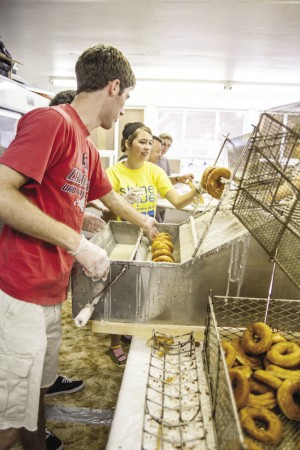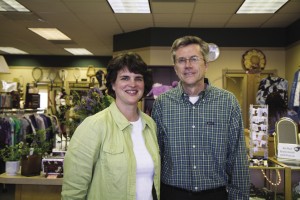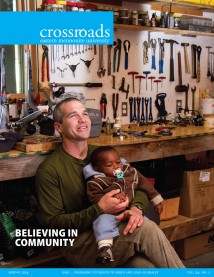
Valerie Showalter Weaver ’76 (left) has managed the local Ten Thousand Villages store for 15
years. Kara Miller ’07 started as a volunteer but is now on staff as volunteer coordinator. (Photo by Jon Styer)
Hundreds of volunteers, many of them EMU alumni, are the backbone of four alumni-run, nonprofit charitable enterprises in Harrisonburg that funnel funds toward worldwide poverty alleviation, relief and development efforts.
Gift & Thrift, and its used-book enterprise, Booksavers of Virginia, and adjacent Artisans’ Hope gift shop (all three in a small shopping strip an easy walk from EMU) function as charitable enterprises that benefit the relief and development work of Mennonite Central Committee (MCC), says Debra Glick King ’77, MBA ’12, general manager of the three. The businesses operate largely with volunteer labor, about 200 men and women these days.
Of the MCC thrift shops in 18 states and five Canadian provinces, Gift & Thrift is the only one in Virginia.
When the store opened on North Main Street in 1982, its first manager, Norman H. Kreider ’60, worked on a volunteer basis, as did the co-managers for the next 12 years: his wife, Dorothy Lehman Kreider ’54, and Marjorie Guengerich (wife of the late EMU administrator Paul Guengerich). Norman Kreider “often engineered remodeling projects” before the Kreiders left to operate Rolling Hills Antique Mall, which they have since sold, says Dorothy. Remarking on Gift & Thrift’s current facility, she adds, “It’s hard to believe the store is what it is now.”

Debra Glick King ’77, MBA ’12, is the general manager of three adjacent charitable enterprises: Gift & Thrift, Booksavers, and Artisans’ Hope. (Photo by Jon Styer)
Jordan Good ’09, a psychology major who handles furniture and electronics at Gift & Thrift, says, “It’s great working at a place where personal values meet organizational values.” Staff and volunteers sometimes do minor repairs on donated items, but Good would like donors to know that repairs make more sense for well-constructed wood furniture than for electronic items.
Artisans’ Hope is one of two stores in Harrisonburg that enables customers to “give twice” by shopping at Fair Trade stores.
Early MCC thrift stores featured “self help crafts” corners with creative gift items from developing nations, committed to fair compensation. Locally, that’s become the mission for two similar stores – Artisans’ Hope and Ten Thousand Villages.
“We try to work together” in referrals and searches, says King.
Artisans’ Hope, she explains, is an “alliance” store of Ten Thousand Villages, operating independently under Gift & Thrift’s umbrella to support Fair Trade organizations and goals.
Fair Trade certification, according to the Fair Trade Federation, requires “fair wages, cooperative workplaces, consumer education, environmental sustainability, financial and technical support, respect for cultural identity, and public accountability.”
King has observed more businesses in the for-profit sector carrying fair trade merchandise in response to the increase in customers who want to make socially responsible purchases.
King came from Lancaster County, Pa., to attend EMU in the late 1970s. Here she met her future husband Dave King ’76 (today EMU’s director of athletics). After graduating as a biology major, she taught school in Pennsylvania until the couple returned to Harrisonburg when Dave took the job at EMU in 2005. Their three children have all graduated from EMU, where King earned an MBA recently to enhance her ability to manage the three charity-focused stores. She likes nonprofit work, but feels “I could be in any business and live out my values and be profitable.”
The store has expanded its clothing inventory. “I love the atmosphere of change for the better, not change for change’s sake,” King adds.
Roy Heatwole ’64, one of many volunteers, enjoys meeting people over the cash register at Artisans’ Hope. He taught mathematics at EMC, 1965-67, prior to a civil service career.
Ten Thousand Villages has grown from the trunk of founder Edna Ruth Byler’s car soon after World War II to nearly 400 stores, including five in Virginia. The Harrisonburg outlet, celebrating its 21st year, began as “International Impressions” and became Ten Thousand Villages when the Villages network adopted that name in 1996, says director Valerie Showalter Weaver ’76. The store moved from the Dayton Farmers Market to the historic district of Harrisonburg in February 2011.
Weaver, from Waynesboro, studied social work at EMU and then worked in social services until she and Greg Weaver ’76 started their family. When, after volunteering at Ten Thousand Villages, she was hired 15 years ago to manage the store, she expected it to be a short-term job, but now she has no plans to leave a business she has grown to love. Kara Miller ’07 also started as a volunteer but is now on staff as volunteer coordinator.
Kelly Brewer Dean ’10, a hospital nurse and Villages volunteer, enjoys telling customers about Fair Trade’s “gifts that give twice.” As a first-year student in a work-study position at Artisans’ Hope, she “fell in love” with the products and mission. Then during her 2008 Middle East cross-cultural, she met one of the olive wood artisans and his wife. Touched by their pride in their work and its benefit to their family, she recalls the moment as “humbling and joyful.”
Kenneth D. Brunk, a volunteer and a board member of the local Villages store, agrees, “I am quite passionate about the huge difference it makes for craftspeople around the world.” He considers every hour volunteered “a direct gift to some friend I have never met who needs to market his or her skill to support their family.”
Ten Thousand Villages is not “eaten up with bureaucracy and process,” as are some NGOs and aid organizations, adds Brunk, who attended EMU in the late 1960s and early 1970s and then did rural development work in East Africa.

EMU students were among the nearly 1,000 volunteers who baked, cooked, sewed, crafted and otherwise contributed to enabling the 2013 Virginia Mennonite Relief Sale to raise about $263,000 for the relief and development efforts of Mennonite Central Committee. (Photo by Michael Sheeler)
Tried and True is co-managed by Deb Rissler Layman ’86, a business administration major who grew up in her family’s local grocery. “Working with people and things comes easily,” she says.
Layman’s shop is one of two thrift shops in Harrisonburg managed by EMU grads. No problem – “the more thrift stores, the better,” Layman says. “Each shop has its own personality.”
Deb and Ken Layman ’80 raised their family while job-sharing – managing Crowded Closet in Iowa City, a shop benefiting MCC; then, managing and expanding Harrisonburg’s Gift and Thrift store from 1996 to 2005. Eventually, wanting to try a different set-up, they opened Tried and True Thrift Shop across town.
The Laymans’ store features silent antique auctions and Ken’s nature-photo cards. Profits totaling $80,000 have supported the Church of the Brethren Global Food Crisis Fund and MCC’s Generations at Risk HIV/AIDS Fund.
The Mennonite relief sale has claimed the energies of David Mininger ’74 each October since the mid-1970s. The Virginia Mennonite Relief Sale features hand-sewn quilts sold at auction, handmade crafts, goods baked by volunteers, and freshly prepared breakfasts and lunches. At first the event was named Augusta Relief Sale and held at Augusta ExpoLand. In its formative period, 1967-1974, this fundraiser occurred on a farm owned by the late Paul Wenger ’27.
For the last 18 years, while earning his living in insurance in Waynesboro (Va.), Mininger has been the grounds chair, in charge of set up and tear down. In 1999, Mininger and his fellow volunteers, most of them members of area Mennonite churches, followed the event when it moved to the Rockingham County Fairgrounds, where it has been a popular annual attraction ever since.
Homemade donuts are a major attraction. Lois Wenger ’76, heads the popular donut-production operation.
Dave says his wife, Marian Leaman Mininger ’74, each year “aims to make about 25 pies and a variety of other baked goods such as cookies, cakes and breads” for the sale. “She is hesitant to state amounts, not wanting to brag or set a precedent. Baking is just something she enjoys doing.” Marian was one of nearly 1,000 volunteers for the 47th Virginia Mennonite Relief Sale in 2013.

Deb ’86 and Ken ’80 Layman co-manage Tried and True, a thrift shop that supports the Church of the Brethren’s Global Food Crisis Fund and the “Generations at Risk” HIV/AIDS Fund of Mennonite Central Committee. (Photo by Jon Styer)
Phil Helmuth ’76, EMU’s executive director of development, chaired the Virginia Relief Sale for a total of seven years, handing off his leadership role in 2010, though he remains a rank-and-file volunteer. He also served as MCC’s coordinator of the organization’s overall North America Relief Sale efforts from 1997 to 2002. During that tenure, 11 new sales in the United States and Canada were added.
North America Relief Sale Coordinator Les Gustafson-Zook said that MCC received $5.45 million from the 46 MCC sales in the United States and Canada in 2013. The Virginia event raised $262,788.
Publicity for the sale is organized by Lisa Bergey Lehman, a 2003 business administration major, who in her paid job is marketing manager for Park View Federal Credit Union.
Sale chairman Dave Rush ’99, a Harrisonburg High School math teacher who has worked with the sale for nine years, notes that for many volunteers, it’s “a big reunion.”
Rush calls the sale “community building at its finest. I may not be working with MCC in another country, but I can do a small part to support the work of those who do.”
— Chris Edwards
